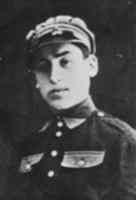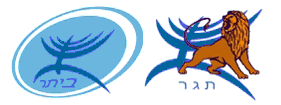|
Shlomo
Ben Yosef
 Born
May 7, 1913 , Died June 29, 1938 Born
May 7, 1913 , Died June 29, 1938
During our long history
in the Diaspora, while we were only passive
onlookers in shaping our destinies, we had
many martyrs. The moment that we took our
future in our own hands, the names of martyrs
gave way to names of heroes. They were simple
men and women, but their names mark the
beginning of an epoch in our history.
The name Shlomo Ben Yosef
is one which has entered our history as
an example for generations to come. It has
become a symbol of the Jewish people's fight
for freedom. Yet he did not die on any battlefield.
He died on the gallows in Palestine -- the
first Jew to receive the death sentence
in that country.
Shlomo Ben Yosef was born
in 1913 in a small Polish town, the son
of a poor family. He joined the Betar while
he was still a young boy, and from that
moment, his life took on a new meaning.
There he learned to love his homeland, Israel,
and there he learned to dream of a new life
for him and for his people. He was taught
that he was not a "poor, dirty Jew"
-- the epithet which had been so often flung
at Jewish youth that they learned not to
question or resent it. He was not a weakling
who had to rely on others and be afraid
of all; he was the son of kings and a descendant
of prophets, a brother of the proud and
courageous Maccabees. He was told that he,
and thousands like him would be called upon
to go to Palestine and make a home there
for the millions who must follow.
He became one of the most
active workers in Betar, waiting for the
day when he could leave for Palestine. When
that time came, however, British restrictions
had been instituted, and there were no certificates
available. No certificates for the thousands
like him, who wanted to leave Europe, but
could not. He saw the withholding of certificates
as an illegal act, a barrier which had been
put up against the entry of Jews into the
land which was theirs by right. Therefore
he decided to join a group of other Betarim
who were leaving for Palestine without certificates.
In August, 1937, his luggage
consisted mainly of his tefillin, he joined
one of the groups of "illegals"
on their way to Palestine. The many months
which they spent on the way, and the hardships
which they had to endure, is a tale which
will form an undying part of Jewish legend.
The "illegal" immigrants, proud
sons and daughters of a people which had
never given up its right to its land, entered
Palestine by the thousands, overcoming all
obstacles in their determination. Among
them was Shlomo Ben Yosef, who immediately
upon his arrival, joined one of the working
groups of Betar, in Rosh Pina.
He arrived in the midst
of terrible times in Palestine. For two
years, riots had been going on steadily,
and daily he heard of new acts of terror,
more women and children who had been killed,
more communities which had been burned,
more Jews who had been molested on the highways.
In the face of all this, Jewish youth remained
silent.
The Yishuv in Eretz Israel
had hoped to overcome those troubled times
by a policy of passive endurance, "Havlaga."
Lest the charge be made that they had provoked
the riots, or had not tried to use peaceful
methods, Jewish youth had decided upon this
policy, and had stood by it for two years,
during which time Arab bandits rode roughshod
across the country. Communities were looted
and burned; the highways became unsafe for
Jewish travelers, and Jews could not venture
from one city to another without protection.
The British police and Mandatory government,
from whom the Yishuv expected protection,
were "unable" to find the terrorists.
Jews and Arabs alike knew what this meant.
Jews became bitter, but remained silent,
while the Arabs renewed their battle cry:
"The Government is with us!"
To Shlomo Ben Yosef the
way seemed clear. If the Government would
not police the country, Jews must be awakened
to their duty of self-protection. More than
the lives of those who had been killed was
at stake. The future of Jewish nationhood,
and lives of all those who lived for the
rebuilding of the Jewish home, were at stake.
Early one morning, April 21, 1938, news
was received that a contingent of Arab terrorists
was on its way to attack a Jewish bus on
the Tiberias road. Nerves that for months
had stood up to sixteen hours of work every
day and five or six hours of guard every
night now almost broke down. In desperation,
three of the youngest Rosh Pina
Betarim -- Abraham Shein, Shalom Zurabin,
and Shlomo Ben Yosef -- went out on to the
Tiberias road. Perhaps they might intercept
the Arab terrorists in time, perhaps they
might frighten them away from the vicinity
A bus passed them: an
Arab bus crammed with fellahin. These must
be the terrorists, thought the youngsters
-- and they fired their revolvers into the
air. The Arab bus gathered speed, and within
a few seconds vanished from sight. Shein,
Zurabin and Ben Yosef waited until the Jewish
bus had
passed them safely on the road. Then, with
the elated feeling that they had prevented
an indescribable tragedy, they left the
hills.
This time the police were
not long in arriving. The first was a Jewish
policeman who suggested to Shlomo Ben Yosef
that he throw away his weapon. He refused
to do this, and a few minutes later other
officers came up and arrested him.
The trial opened in the
last week of May 1938. It was very late
on Friday afternoon, June 3rd. With a face
pale as a ghost's, the president of the
Haifa Military Court pronounced the verdict.
Shalom Zurabin was to be placed under medical
observation, Abraham Shein and Shlomo Ben
Yosef were to hand by the neck until they
were dead.
The tense electric silence
of the courtroom was broken by a dreadful
shriek from Shein's sister. She understood
no English, and for ten days she had been
listening to the evidence that would decide
whether her little 18-year-old brother --
now standing up so proudly in the dock --
was to
live or die. This Friday afternoon she could
see from the sea of blurred faces around
her, which it was to be. She collapsed in
a fit of uncontrollable sobbing.
In a voice that stammered
and shook, a Jewish interpreter tried to
read out the verdict in Hebrew. He sat down,
overcome before he got through to the end.
The prisoners were led
out. Ben Yosef stood up and shouted: "It
is good to die for the Jewish State on both
sides of the Jordan" and he went out
with his two comrades -- the only cool,
detached and unagitated people in the entire
courtroom.
After that came three
and a half weeks of unceasing attempt to
secure a reprieve. Appeals to the British
Government and the Palestine Administration
came from the Jewish national organizations,
from the Chief Rabbi of the British Empire,
from two Anglican bishops, from the "Manchester
Guardian," from the Polish Government,
from Chief Rabbi Herzog of Palestine; from
British MP's and newspaper editors, from
churches and synagogues, from Ben Yosef's
aged mother in Poland who begged only that
her young son's life be spared until she
could reach Palestine to see him for the
last time. Jabotinsky himself went to plead
with Britain's Colonial Secretary, Malcolm
MacDonald. In thousands, the petitions came,
but in vain; Shein's sentence was commuted,
but Ben Yosef was sacrificed.
Ben Yosef was executed
in June, 1938; the whole Jewish world was
shocked by the injustice of this, and was
deeply moved by the heroism of the young
man, in the face of death. On the morning
of the execution, Shlomo Ben Yosef was calm,
filled with the knowledge that his death
would not be in vain. He requested that
he be permitted to go to the gallows in
his Betar uniform. To the friends who were
allowed to visit him in his cell, a few
hours before the execution, he said, "I
have written on the walls of my cell 'to
die or to conquer the hill' ... My death
will serve as a symbol of our battle. Betar
will march forward, only forward, because
this is our mission. Betar must know how
to live, how to fight, and how to die. Please
tell Jabotinsky that I will go to the gallows
with his song on my lips -- the song which
I learned ten years ago, about the proud
future Jewish generation. My journey to
Eretz Israel was a hard one. I did not come
with a certificate. I came as a Betari,
and I shall die as one, proudly. I entered
Palestine in contravention to the laws of
the British, but I shall die in accordance
with their 'justice' ..."
In the mountains around
Rosh Pina lies the grave of Shlomo Ben Yosef
-- a simple grave with a few heavy stoned
around it. Here lies a son of his people,
brave and honest, and sincere. He had returned
to his home after 2000 years of absence.
He had come a make a place for thousands
and thousands after him. A brutal hand put
an end to his life, but not to the ideal
for which he fought and died.
Shlomo Ben Yosef was right.
The Jewish Youth of Eretz Israel heard this
shot and broke their silence. He was the
first, but not the last. Many young boys
and girls, in the few short years after
his death, gave their lives for the same
cause.
Shlomo Ben Yosef came
to Eretz Israel on a peaceful mission, to
rebuild the land for his people, but he
found it necessary to fight for the right
to do this. Jewish youth did not seek the
conflict, but when it was forced upon them,
they had to learn to face it. He taught
them this, and when the young people of
Israel were again faced with the necessity
to fight -- this time not the Arab marauders
who had the tacit approval of the British
administration, but the administration itself
-- his name took on new meaning as one of
their first heroes.
------
There have been many famous
Betaris throught our long history. You can
click on the links below to read about these
special and brave individuals.
|

